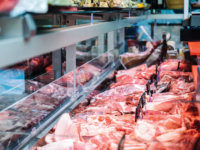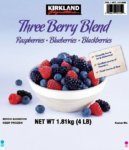The USDA is pursuing the privatization of food safety inspections in beef slaughter plants.
According to documents obtained by Food & Water Watch via the Freedom of Information Act, Tyson Foods recently requested a waiver to allow Tyson employees to conduct more inspections in place of USDA food safety inspectors. “This dangerous proposal could rid beef slaughter plants of most government inspectors,” said the Food & Water Watch in a statement. According to the article, the USDA is planning to “deregulate the inspection system for beef slaughter plants,” just like they did in the poultry and pork sectors over 20 years ago. In 1998, the USDA’s Food Safety and Inspection Service (FSIS) allowed for the number of federal inspectors to be replaced by company employees at two dozen poultry plants and five hog slaughter plants. In 2014, this system included the entire poultry industry. In 2018 the pork industry followed with the FSIS creating the New Swine Slaughter Inspection System.
According to the Food & Water Watch, this puts consumer safety at risk, as companies are likely to inspect themselves differently than if an outside regulator was to. According to the USDA Office of the Inspector General, “We… found FSIS could not determine whether the goals of a pilot program… were met because FSIS did not adequately oversee the program. In the 15 years since the program’s inception, FSIS did not critically assess whether the new inspection process had measurably improved food safety at each (pilot) plant, a key goal of the program.” @ https://www.nationofchange.org/2019/06/12/the-usda-wants-to-privatize-food-safety-inspections/
Andrea-M
“This dangerous proposal could rid beef slaughter plants of most government inspectors.”
Andrea-M
The FDA announced that Townsend Farms, Inc. has notified Costco that a recent FDA test indicated that a domestic conventional frozen blackberry product manufactured by Townsend Farms, Inc., may be contaminated with Hepatitis A. The domestic conventional frozen blackberry from Townsend Farms was used to manufacture the Kirkland Signature Three Berry Blend product. The product has a Best By Dates between February 16, 2020, and May 4, 2020. The product was sold in Costco stores located in San Diego and Los Angles, California and Hawaii. No product manufactured for Costco by Townsend Farms has tested positive for Hepatitis A. Costco has no product in its current inventory. Costco has been notifying its members about the potential health risk. According to the FDA and CDC, there have been no customer illness reports to date related to any product manufactured by Townsend Farms, Inc., using these blackberries. @ https://www.fda.gov/safety/recalls-market-withdrawals-safety-alerts/townsend-farms-inc-notifies-costco-possible-health-risk-and-recalls-conventional-frozen-kirkland
https://www.fda.gov/safety/recalls-market-withdrawals-safety-alerts/townsend-farms-inc-notifies-costco-possible-health-risk-and-recalls-conventional-frozen-kirkland
Andrea-M
A new method for the rapid detection of Salmonella is described (Food Control, Vol 104, Pages 9-19 (2019) https://www.sciencedirect.com/science/article/pii/S0956713519301616). The method combines loop-mediated isothermal amplification with lateral flow dipstick (LAMP-LFD) targetting hilA gene. Compared with PCR and real-time PCR methods, the LAMP-LFD assay has the same specificity and higher sensitivity and required only 40 min (10 min for LFD detection) at 65 °C. The 52 strains of Salmonella tested, yielded positive results using the LAMP-LFD assay, and showed no cross-reactivity with 37 tested non-Salmonella strains. The detection limit of the LAMP-LFD assay was 6.7 CFU/mL (1000X more sensitive than conventional PCR and 100X more sensitive than real-time PCR). The new method could detect Salmonella in artificially contaminated food samples (milk, pork, beef, and chicken) when present as low as 144 CFU/mL or CFU/g and without the use of an enrichment step. After an enrichment step at 37 °C for 6 h, the results showed 100% accuracy compared to the standard culture-based.
Salmonella strains are major foodborne pathogens for the animals and humans, presenting a significant threat to food safety and public health worldwid…
Andrea-M
Researchers at Urmia University in Iran developed a novel pH sensor to test the freshness on rainbow trout. The sensor was prepared by incorporation of alizarin in a starch-cellulose paper and had a good color change from yellow to purple at pH 2–11 and greater color stability after two months of storage at 4 °C. The research found that the color change was correlated to bacteria count in the fish. The study was published in the International Journal of Biological Macromolecules Vol. 132, Pages 157-165 @ https://www.sciencedirect.com/science/article/pii/S0141813019304635
A novel pH-sensitive indicator was prepared by incorporation of alizarin in a starch-cellulose paper to monitor the freshness of rainbow trout fillet.…


